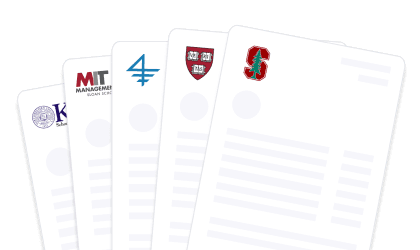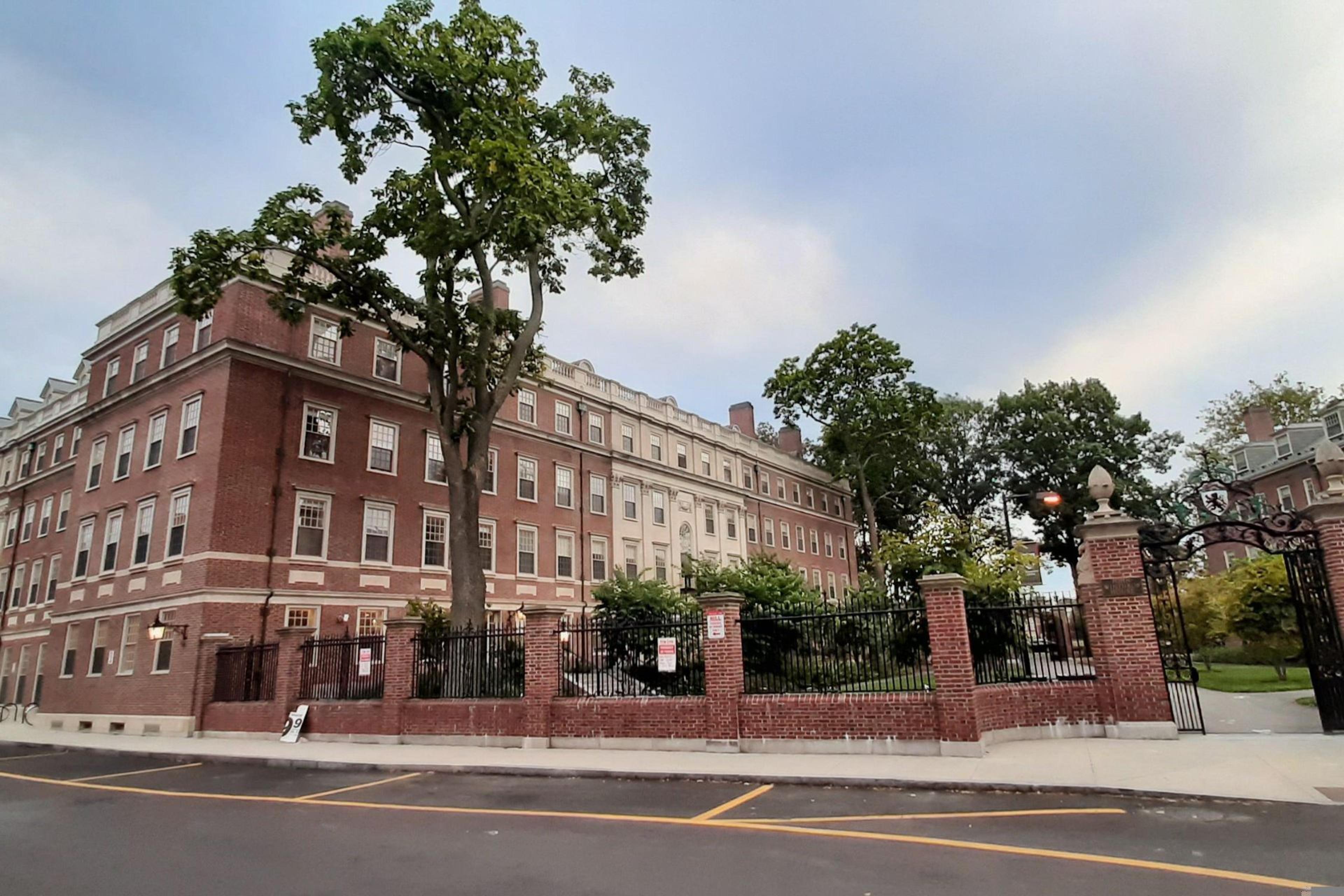
Join a free event
Learn from top coaches and industry experts in live, interactive sessions you can join for free.
Table of Contents
Strong Harvard letters of recommendation can tip the scales in your favor. These letters give admissions officers insight into your academic potential, character, and fit for Harvard College beyond test scores and grades. But what makes a great letter? Who should write them? And how can you ensure yours stands out in a sea of thousands?
This guide breaks down exactly how to secure Harvard recommendation letters that are detailed, personal, and persuasive, giving the admissions committee every reason to say yes.
Does Harvard Require Letters of Recommendation?
Yes, Harvard requires letters of recommendation from all applicants. You must submit two letters from academic teachers and one from your school counselor. These letters help Harvard assess your academic ability, character, and potential by offering insight beyond grades, test scores, and essays.
How Many Letters of Recommendation Does Harvard Require?
Harvard College requires three letters of recommendation:
- Two teacher evaluations from instructors in different academic subjects (like math, science, English, history, or a foreign language)
- One from your school counselor
Should You Submit Additional Letters?
Yes, but only if they provide new, meaningful perspectives. For example, a supplemental letter from a community service leader or research mentor can add value if it speaks to areas your teachers can’t. If you wish to submit these additional letters, you can do so after you submit your application through this form.
Harvard states clearly: “If you wish to submit additional letters of recommendation, you can do so after you submit your application. In your application confirmation email, there will be a personalized link to send to your recommenders.”
Expert Tip: Don’t submit an additional letter just because someone has an impressive title. A great letter comes from someone who truly knows you. Quality over prestige always wins and that comes from your recommender deeply knowing you over an extended period of time.
Why Your Recommendation Letters Matter
These letters are crucial parts of your application process because they help the admissions office see who you are beyond your application essays, ACT/SAT scores, and extracurricular activities.
Harvard’s official blog states the following on the role and importance of letters of recommendation:
“Showing how you interact with your peers in the classroom or teammates during a competition, for instance, gives admissions committees a sense of how you will fit into their community. Recommendations can also highlight strengths – such as persistence and commitment to hard work – that might not be evident from test scores.”
The admissions committee weighs them heavily because they are coming from a third-party source, someone who is not you but who has observed you in your environment.
What Harvard Admissions Officers Look For
Recommendation letters to Harvard aren’t just checkboxes – they’re crucial pieces of the application puzzle. A strong letter gives admissions officers insight into how you think, how you lead, and how you show up in a community. Harvard admissions officers are looking for reasons to say yes, and great letters help them picture you at the university.
Across thousands of applications, Harvard consistently looks for evidence of four qualities: intellectual vitality, initiative, character, and long-term potential. Your recommenders should be guided by these themes, and be able to back them up with concrete, memorable examples.
1. Academic Curiosity
Harvard cares deeply about curiosity, not just achievement. The strongest letters highlight moments when you were intellectually alive: asking incisive questions, pursuing ideas outside class, or challenging assumptions. Maybe your teacher caught you reading philosophy in your free time, or noticed how you reframed a debate with a historical lens. These are signs that you’ll thrive in Harvard’s seminar-heavy, discussion-based environment.
Expert Tip: Specific examples of independent thought matter most, not just high grades.
2. Leadership and Initiative
Harvard doesn’t just want students who take opportunities: they want students who create them. A powerful letter might describe how you launched a tutoring program, took ownership of a group project that was floundering, or organized peers around a shared cause. Leadership here isn’t about titles here, it’s about impact.
Expert Tip: In your prep doc or initial conversation, think about and encourage recommenders to include moments where you made things better for others, even behind the scenes. This tells Harvard, “This candidate isn’t just a great student, bringing him on campus will make the experience better for everyone.”
3. Character and Collaboration
Academic success gets you through the first read. Character keeps you in the conversation. Harvard wants to know: Are you thoughtful? Kind? Respectful in disagreement? Collaborative in groups? A great letter might describe how you supported a struggling peer, engaged with empathy during a tough class discussion, or quietly led by example during a team conflict. Basically this is asking: are you the kind of person that others would want in the classroom and dorms?
4. Trajectory & Future Impact
Harvard isn't just admitting who you are now, they’re investing in who you’ll become. The most persuasive letters convey a sense of trajectory: not just “here’s what she did,” but “here’s why she’s just getting started.” Recommenders should convey belief in your future – whether that’s groundbreaking research, meaningful public service, or community leadership.
Expert Tip: In letters of recommendation, this can often be included with language that signals vision: “I can’t wait to see what he does next,” or “She’s the kind of student who changes institutions, not just navigates them.”
Who to Ask for Your Recommenders
To craft strong letters, start by choosing the right recommenders – teachers who have taught you in academic subjects like math, science, history, English, or social studies. Harvard recommends selecting two teachers from different academic subjects to give a broad view of your abilities.
Harvard also provides the following advice: “Of course, if possible you should pick a class in which you have done well. You may also want to think about classes you enjoy the most, where you participate more frequently, or where you’ve worked with the teacher in a one-on-one setting on a project or to get extra help.”
Who Should You Ask?
- Teachers from your junior or senior year who’ve seen your recent academic growth
- A school counselor who can comment on your overall journey, goals, and personal challenges
- People who can provide insight beyond your grades, such as your personal growth, initiative, or resilience
- Do not include family members or personal acquaintances
Other possibilities include coaches, club advisors, employers, or leaders at a volunteer opportunity – these individuals are helpful because they can provide insights into your strengths in non-academic settings. These are great additional recommenders, but your two teacher recommendations should always come first.
How to Prepare Your Recommenders
While you absolutely should not write the letter yourself, you can set your recommenders up for success by giving them what they need to write stellar letters.
After you’ve confirmed who your writers will be (a conversation that should be thoughtful and happen in-person), we highly recommend providing them with a “letter of rec prep doc” that includes the following:
1. First, make sure to thank them for being willing to write you a letter. This takes a lot of time and energy from their end.
2. Second, outline the basics:
- Why you are asking them ("You've seen my growth in AP Chem, and I think you can speak to my work ethic and curiosity.”)
- What school(s) the letter is for
- Any requirements they should know about
- How to submit the letter
- When the recommendation is due
3. Third, brag! This is not the time to be humble. Your recommenders should have an idea of what they want to write about but giving them a list of your accomplishments, examples of excellence, qualities you’d like them to highlight, etc. increases the odds that your letter is as strong as possible. This section should include your general accomplishments as well as specific examples that are applicable to that recommender. For example, if your science teacher is writing your letter, think back to your “highlights” in science class. Was there a project that you excelled on? A test that everyone did poorly on but you aced? How have you stood out in that class?
4. Fourth, provide context. To further strengthen this doc, give them an idea of your academic journey and goals. Why do you want to go to Harvard? What are you intending to study? What motivates you? What do you want to do with your life and why is Harvard an important part of that? Here, you can also include your personal statement if you’ve written one and/or a resume, list of extracurriculars, etc. The more they understand your big picture, the more naturally they can support your narrative.
Additional Tips
Specificity and superlatives are what separates average letters from memorable ones. Encourage your recommenders to go beyond generic praise like “hardworking” or “a joy to teach.” Great letters include vivid examples, exact moments, and comparison-level praise – “one of the top three students I’ve taught in 20 years” or “led the most thoughtful classroom discussion I’ve seen all semester.” These details stick with admissions readers and elevate your letter above the pile.
Tactically decide what you want to highlight in your letters of recommendation compared to what else you are focusing on in the rest of your application. Think of your application as a portfolio – your rec letters should complement, not copy, your essays. If your personal statement focuses on your identity or background, have one letter emphasize academic rigor and the other highlight leadership or character. Guide each recommender toward a specific lens so your letters tell a fuller, more strategic story.
Ask early and again, express gratitude. Reach out at least 6-8 weeks before your first deadline. Some experts recommend asking even earlier, like the spring before your senior year in order to ask before the teachers are inundated with requests. They are often writing for dozens of students and appreciate time to think and write. Once submitted, send a thank-you note that’s personal and specific. For bonus points, mention what their class meant to you or how their support has impacted your journey. Gratitude builds lasting mentorship, not just a one-time favor.
Harvard Recommendation Letter Examples & Analysis
Strong letters of recommendation don’t just praise a student—they tell a story. The most compelling letters give admissions officers a window into how a student thinks, contributes, grows, and leads. Here are three realistic examples of standout letters that would strengthen a Harvard application.
Example #1
From: AP English Literature Teacher
“When I first met Sofia in 11th grade, she was soft-spoken and rarely volunteered in class discussions. But within a few months, I noticed something unusual: her written analyses consistently pushed beyond the assignment – grappling with moral ambiguity, structural nuance, and historical subtext in ways I rarely see, even in my AP seniors. Her essay comparing Morrison and Marquez was one of the most insightful pieces I’ve read in 17 years of teaching. By spring, she had become the quiet anchor of our Socratic seminars: listening deeply, asking pointed follow-ups, and gently elevating the level of conversation. Sofia is one of the most intellectually mature and emotionally intelligent students I’ve ever taught.”
Why it works: Shows transformation over time, specific moments of brilliance, and superlative comparison, all signs of both intellectual engagement and character.
Example #2
From: Honors Biology Teacher & Research Advisor
“I taught Diego in Honors Bio and supervised his summer research project at the local university’s marine science lab. He proposed his own study on microplastic ingestion in plankton, designed a data collection framework, and impressed the lab’s PhD students with both his statistical analysis and his unrelenting curiosity. What stood out most wasn’t just his scientific thinking – it was his drive. He stayed late to run extra samples, revised his hypothesis three times, and taught himself R to visualize his findings. I’ve worked with dozens of students on research initiatives, but Diego is among the very few I’d describe as a true emerging scientist.”
Why it works: Highlights initiative, independence, and college-level academic ability, plus credibility from a teacher with research experience.
Example #3
From: School Counselor
“Ethan is the rare student who makes a school better just by being in it. As a sophomore, he noticed that new ESL students were often isolated, so he created a peer mentorship program – recruiting bilingual volunteers, organizing events, and advocating for translation resources at PTA meetings. I’ve watched him mentor younger students, mediate conflicts during student council, and handle setbacks with a level of maturity that’s honestly uncommon even among adults. Ethan doesn’t seek recognition, he seeks connection. I believe he will bring that same spirit of empathy and initiative to Harvard’s community.”
Why it works: This letter speaks to leadership, integrity, and community-mindedness – all major priorities for Harvard’s holistic admissions model.
5 Tips to Ensure Smooth Rec Letter Submission
As deadlines approach, make sure every letter gets to Harvard without issue:
- Start early – Reach out to your recommenders by the beginning of senior year, ideally by September. This gives them time to write thoughtful, personalized letters without being rushed, especially during a busy season when they may be writing for multiple students.
- Use the correct platform – Make sure your recommenders know whether to upload their letters through the Common Application, Coalition Application, or another Harvard-approved portal. If Harvard is on your list for early action, double-check the earlier deadline to avoid last-minute confusion.
- Provide detailed instructions – Share Harvard’s specific deadlines, your applicant ID (if applicable), and any required supplemental documents. If you’re sending additional letters, clarify who should submit them and where. A one-page guide or email summary can be incredibly helpful.
- Confirm submission – About one week before the deadline, politely follow up with each recommender to ensure they’ve submitted their letter. You can also check your application portal to confirm receipt by the admissions office. If something is missing, you’ll have time to troubleshoot.
- Avoid duplicate messages – Once a letter has been submitted, resist the urge to resend unless there’s been a significant update or error. The admissions committee values professionalism, and duplicate messages can create unnecessary confusion.
Read: Top 25 Free Resources for Your College Application
The Bottom Line: The Best Letters Tell Your Story
The best letters of recommendation offer a deeper portrait of who you are, how you think, and how you’ve grown over time. They show Harvard not only what you’ve accomplished, but how you move through the world: curious, collaborative, driven, and ready to make a difference.
By choosing the right people, guiding them with care, and staying proactive throughout the application process, you give the Harvard admissions team exactly what they’re looking for: a clear, authentic, and compelling picture of why you belong at Harvard College.
And if you want to take your application strategy to the next level, working with a top college admissions coach can give you an extra edge. The best coaches help you build a cohesive application, position your strengths effectively, and make sure every part – from your essays to your recommendation letters – tells a powerful, unified story.
Read these next:
- How to Write an Amazing Common App Essay — with Examples
- Law School Interviews: Questions, Answers & Expert Tips
- JD Recommender Criteria for the Top Law Schools
FAQs
How many letters should I submit?
- You need two teacher recommendations and one counselor recommendation. You may submit additional letters if they offer new insights—but only 1 or 2.
Does Harvard accept letters from outside school?
- Yes, but they should come from someone who’s seen a specific commitment, such as a volunteer director or family member mentor in a professional setting. Avoid vague reference letters.
Can I submit more than two teacher recommendations to Harvard College?
- Harvard requires two teacher recommendations from instructors in different academic subjects. While you can submit additional letters, it's important to ensure that any extra recommendations provide new insights into your abilities or character, rather than reiterating information already presented.
Can my recommenders submit their letters after I have submitted my application?
- Yes, you can submit your application before your recommenders have submitted their letters. However, it's crucial to ensure that all recommendation letters are received by Harvard's application deadline.
Should recommendation letters be tailored to my intended major or field of study?
- While not mandatory, it's advantageous if your recommendation letters align with your academic interests or intended field of study. Recommenders who can speak to your strengths in areas related to your prospective major can provide valuable context for your application.
Browse hundreds of expert coaches
Leland coaches have helped thousands of people achieve their goals. A dedicated mentor can make all the difference.


























